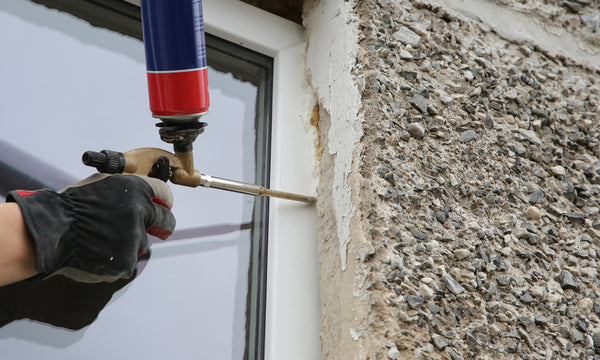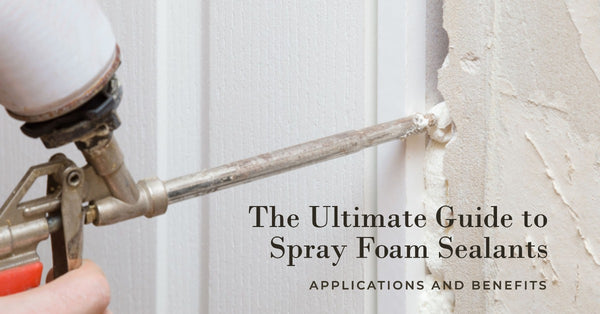Introduction
Spray foam sealants have become an essential component in construction projects due to their versatility, insulation properties, and durability. To get the results you want from your project, selecting the appropriate sealant is essential. In this ultimate guide, we'll explore the world of spray foam sealants, discuss their applications, benefits, and address common questions, such as the difference between spray foam sealant and insulation. We'll also delve into the advantages of using Tytan Professional Sealants, a leading brand in the industry.
What are Spray Foam Sealants?
Spray foam sealants are made from polyurethane, a versatile and durable material. They are designed to expand upon application, filling gaps, cracks, and crevices to create an airtight and watertight seal. Spray foam sealants are classified into two types: open-cell and closed-cell. Open-cell foam is lightweight and more flexible, while closed-cell foam is denser, providing more structural reinforcement and higher insulation values. Both types cure into a solid material, creating a barrier that insulates, reinforces, and protects against air and moisture infiltration.
Key Benefits of Using Spray Foam Sealants
-
Insulation properties (thermal and acoustic): Spray foam sealants offer excellent thermal insulation, reducing heat transfer and helping maintain consistent indoor temperatures. They also provide acoustic insulation, dampening sound transmission between spaces.
-
Air sealing and moisture control: Spray foam sealants create an airtight and watertight barrier, preventing drafts and moisture infiltration, reducing the risk of mold growth and improving indoor air quality.
-
Structural reinforcement and stability: Closed-cell spray foam sealants add structural strength to walls, roofs, and other building components by bonding and reinforcing the materials.
-
Energy efficiency and cost savings: Effective insulation and air sealing reduce energy consumption, leading to lower utility bills and a reduced carbon footprint.
-
Eco-friendly options and sustainability: Some spray foam sealants use environmentally-friendly blowing agents and recycled materials, contributing to a more sustainable construction process.
Common Applications of Spray Foam Sealants
-
Residential and Commercial Insulation: Spray foam sealants are commonly used in wall cavities, attic spaces, crawl spaces, and HVAC ductwork for insulation purposes.
-
Air Sealing and Weatherproofing: They are also used around windows, doors, and other gaps to create an airtight seal, improving energy efficiency and comfort. Tytan Professional Window and Door is a great foam sealant for sealing windows and doors in residential and commercial construction.
-
Roofing and Foundation Applications: Spray foam sealants can be applied to flat and low-slope roofs for waterproofing and insulation, as well as in basements and foundations for moisture control and structural reinforcement.
-
Specialty Applications: Spray foam sealants can be used for soundproofing, as well as in marine and automotive industries for insulation and structural support.
The Difference Between Spray Foam Sealant and Spray Foam Insulation
Spray foam sealant is designed to create airtight and watertight seals in gaps, cracks, and joints. Spray foam insulation on the other hand is designed to provide thermal and acoustic insulation mostly for larger areas, such as walls, ceilings, and floors. While both products are made from polyurethane and share some similarities, they serve different purposes and have different characteristics. Spray foam sealants typically have a higher expansion rate and are more flexible, while spray foam insulation provides better thermal insulation and is often more rigid when cured.
How to Choose the Right Spray Foam Sealant for Your Project
To select the appropriate spray foam sealant for your project, consider the following factors:
-
Assess the specific needs of your project: Determine the primary purpose of the sealant, whether it's for insulation, air sealing, structural reinforcement, or a combination of these.
-
Compare open-cell and closed-cell foam properties: Open-cell foam is more flexible and ideal for filling irregular gaps and spaces. Closed-cell foam provides better insulation and structural reinforcement.
-
Consult with professionals: Seek expert advice from construction professionals or your local retailer, like Timothy's Toolbox, to ensure you choose the right product for your project.

Tytan Professional Sealants
Tytan Professional offers a wide range of high-quality spray foam sealants (as well as foam-like adhesives) designed for various construction and finishing applications. By choosing Tytan Professional Sealants for your project, you can ensure a strong, durable bond and airtight seal, while benefiting from their exceptional insulation properties.
Safety Precautions and Best Practices
When working with spray foam sealants, it's essential to follow safety precautions and best practices, including:
-
Proper handling and storage of spray foam sealants: Store the products in a cool, dry place, away from direct sunlight, heat sources, and ignition sources.
-
Personal protective equipment (PPE): Protect your skin, eyes, and respiratory system by using suitable PPE such as gloves, safety goggles, and a respirator.
-
Ventilation and curing time considerations: Work in a well-ventilated area and allow the sealant to cure completely before occupying the space or applying additional materials, like paint or trim.
Conclusion
Spray foam sealants offer numerous advantages in construction projects, including insulation, air sealing, and structural reinforcement. Understanding the differences between spray foam sealants and insulation, as well as their various applications, will help you make informed decisions when selecting products for your project. With Tytan Professional Sealants, you can achieve a durable, efficient, and comfortable building environment, ensuring long-lasting results and satisfaction.




Leave a comment